By Kirsten Coachman
With 14 number-one singles—including “Angels”—and 80 million sales worldwide, British pop star Robbie Williams has more than made his mark in the world of music.
In “Better Man,” the fantastical new biopic from writer/director Michael Gracey (“The Greatest Showman”), the film goes back to the beginning, as Williams spends his childhood growing up in Stoke-on-Trent, Staffordshire, England. Early on, his dad (Steve Pemberton, “The League of Gentlemen”) impressed on him a desire to perform.
“You can’t learn it. You’re either born with it, or you’re a nobody,” his dad tells a young Williams in the film as the two watch Frank Sinatra on TV.
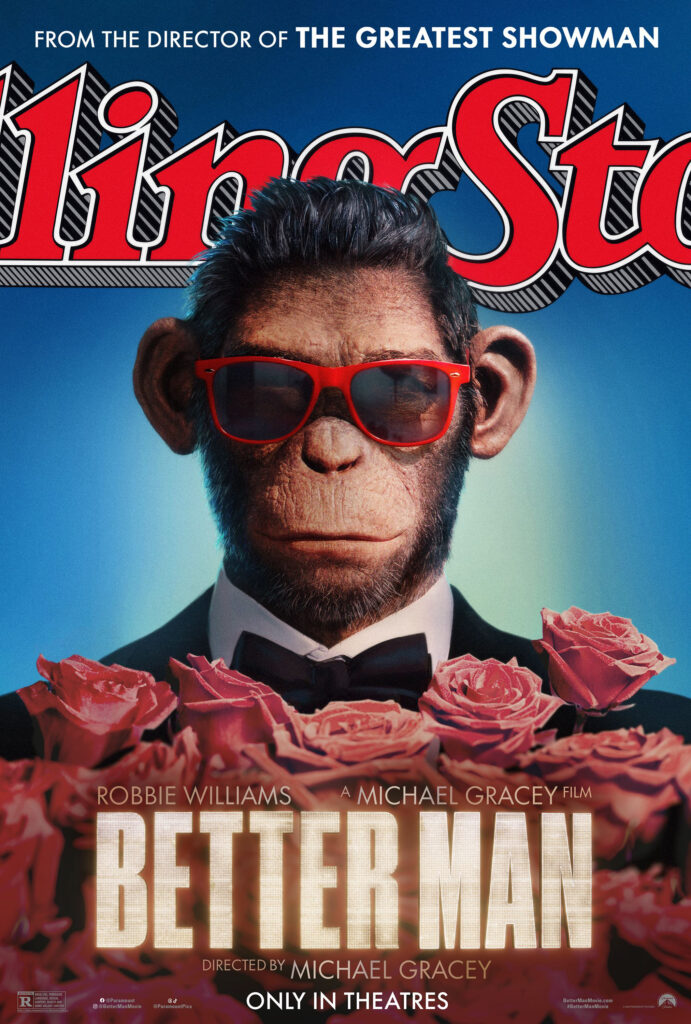
With the support of his grandmother (Allison Steadman, “Life is Sweet”) and mom (Kate Mulvany, “Hunters”), “Better Man” follows Williams in the runup to a meteoric rise as an original member and wild child of boyband Take That as a teen, his struggles with addiction, and the rocky climb to solo pop stardom.
In an era where musical biopics have become—for better or for worse—increasingly common, Gracey takes a bold swing in telling Williams’ story in an unexpected manner: as a chimpanzee.
I know what you’re thinking, but let me tell you, it works and is oddly brilliant.
While Williams himself narrates his story, behind the chimpanzee that audiences see onscreen is actor Jonno Davies (“Kingsman: The Secret Service”), who donned a motion capture suit throughout filming to help bring Williams to life.
Art U News had the opportunity to sit down with Gracey and Davies while they were in town last fall for the Mill Valley Film Festival to learn more about the making of their new film, including pitching the film to Williams, creating a memorable onscreen musical sequence, and collaborating with Wētā FX to bring out Williams’ inner-chimp.
Michael, you’ve previously spoken about how, in reviewing your interviews with Robbie, it was hearing him refer to himself as sort of like a “performing monkey” that sparked this idea of telling his story in the way he saw himself. What was his reaction when you pitched him that idea?
Michael Gracey (MG): He was on board unbelievably quickly. Like, it kind of blew my mind. You want it to be their idea. So I did pitch to him, “If you were an animal, how would you see yourself?” And he immediately said, “Lion,” with this big grin on his face. And I was like, “You’re not a lion.” So then I kind of looked at him kind of questioning, “Really?” And the next beat, without even being told, he went, “Well, actually, I’m more like a monkey, a cheeky monkey.” And that literally was the window that I needed to then say, “Why don’t we do this?” And from that first pitch, he was like, “Yep, let’s do it.” He was really excited about the concept of representing him in the film, not as we see him, but as he sees himself. And that, as a conceit, he just thought was great.
What I liked about this biopic, in particular, is that Robbie’s struggles and his vulnerability are front and center. Was there any concern at all that he might go, “Nah, I don’t want that version of me on screen”?
MG: Yeah, there was; to be fair, he dispelled that very early on. I think one of the things about Robbie is that when you watch him in interviews, he says the things that you really shouldn’t if you’ve done media training, and that’s what’s exciting about watching him in interviews is he literally will say anything. He’s just an oversharer. That’s who he is. That’s his personality. So I think, in some ways, because this film is a little unfiltered in that respect, you get a much more honest representation of who he is. I think that in a lot of musical biopics, if they’re dead, you have the estate trying to protect the legacy. And if they’re alive, you’ve got someone saying, “I don’t really want that part of me up there on the big screen.” I think you tend to get musical biopics that are watered down. As a result, it was a real credit to Rob to allow us to put a very unfiltered version of him up on that screen.
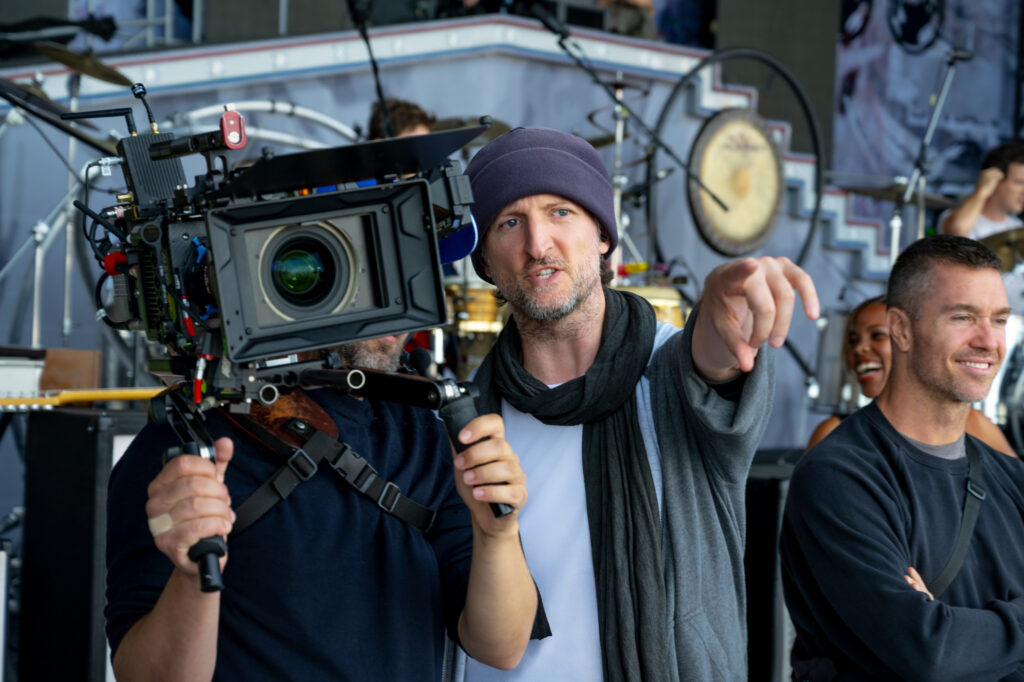
Absolutely. Jonno, was there any hesitancy in playing a role where your face wasn’t gonna be seen? Or did it present kind of a fun acting challenge?
Jonno Davies (JD): It was totally that. I mean, you look at it, and you go, “Oh, well, it’s not gonna help me get other work ’cause no one’s gonna recognize me.” You know? But in terms of, like you said, the challenge, it opened so many doors to what we could collaboratively do. The monkey allowed us to go into fantasy so much easier, allowed us to take the story and the musical numbers into a whole kind of cinematic art rather than a traditional music biopic.
And I think vanity, it meant that that completely went out the window. I was then able to not worry, not kind of constrict anything I was doing, not worry about how it was seen, it was just about how everything felt. And that’s a gift for an actor that they’re focusing on the truth of the story, the truth of the person that you’re playing. And then trusting Wētā, trusting Michael to be able to put that kind of lens on top of the performance.
How was your experience performing in the motion capture suit?
JD: There were little things, like when you are performing, costume [can play] a contributing factor, you feel very differently in a suit as to when you do in your tracksuit bottoms and stuff. And so you don’t have those devices to help you within the scene. They had the camera boom that’s right in front of your face, kind of in between the eye line. That was sometimes tricky to first get to grips with. ‘Cause just like any other type of acting, the eye contact, the connection with your fellow scene partners was so integral. But then from there on in, it’s just like any other acting, really. It’s the tennis match between you and your scene partner. The sort of distractions are gone because it is just you, you have nothing to kind of lean on as a crook. It’s very exposing. And again, that was another really exciting challenge to do. You have to really back your whys [and] what you are achieving in each scene. And so, it was a really freeing way to perform.
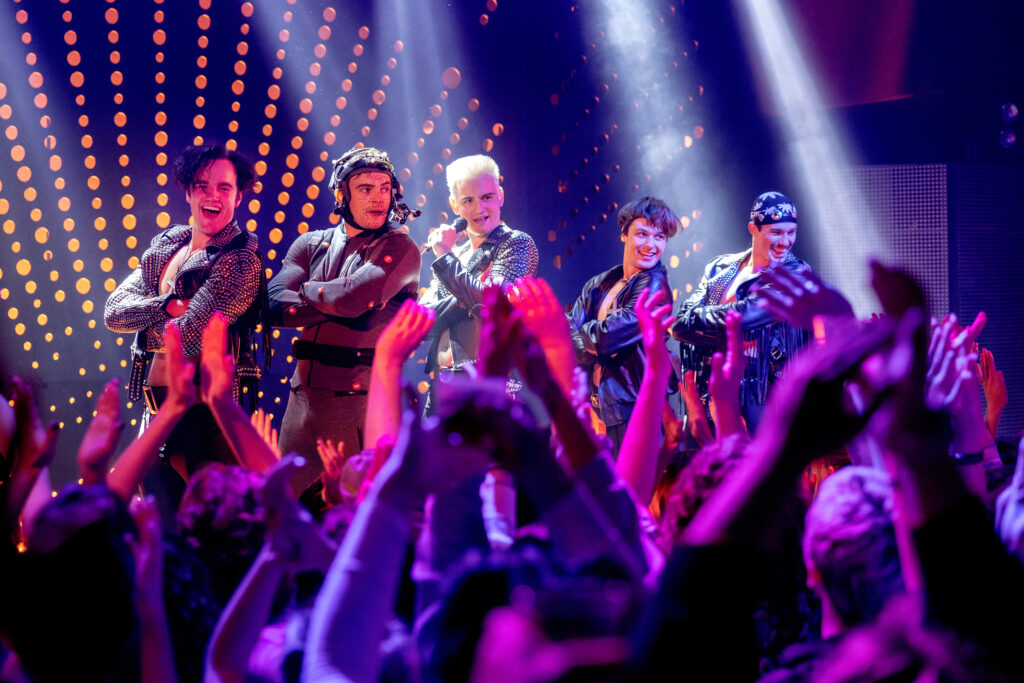
Being that Robbie is one of the biggest performers on the planet, did the film present a chance to embrace your inner pop star when it comes to like stepping into his stage presence?
MG: She’s onto you.
JD: She smelled blood. Yeah. Michael used to take the bit quite a lot that I was enjoying it a little bit too much sometimes. [Laughs.] Look, I wanted to be a pop star when I was younger. I think that’s partly due to Robbie. I saw him in concert when I was nine with my mom and dad. And you couldn’t move in the UK without hearing his music, without seeing a poster of him. I auditioned for “X Factor” when I was 15. I didn’t even get through the first round with the producers. It was a hard no. And at that time, I think that was the only way to get into the music industry. So I was like, “Oh, that’s that dream dead.” So then to be able to kind of do this role and get to be a rock star for three to four months was, you know, it was a total dream.
I have a theater background so that connection that you have with an audience is something that I’ve always loved. So to be able to do that in a musical form, was intoxicating. It was very addictive. And I’ve spoken about this before and it was that side of Rob that I actually found the hardest to tap into. ‘Cause he really disliked performing for a long part of his career, and he had to switch on that performer mode. Whereas for me, I’m going, “This is amazing,” you know? So that was part of his psyche that was probably the hardest part to get into. But then when you start doing it over and over and over again, kind of 60, 70 takes, and the initial adrenaline of it wears off, and then you are running on fumes. That’s when I started to understand just the sheer demand of what it takes to be someone as globally famous as Rob.
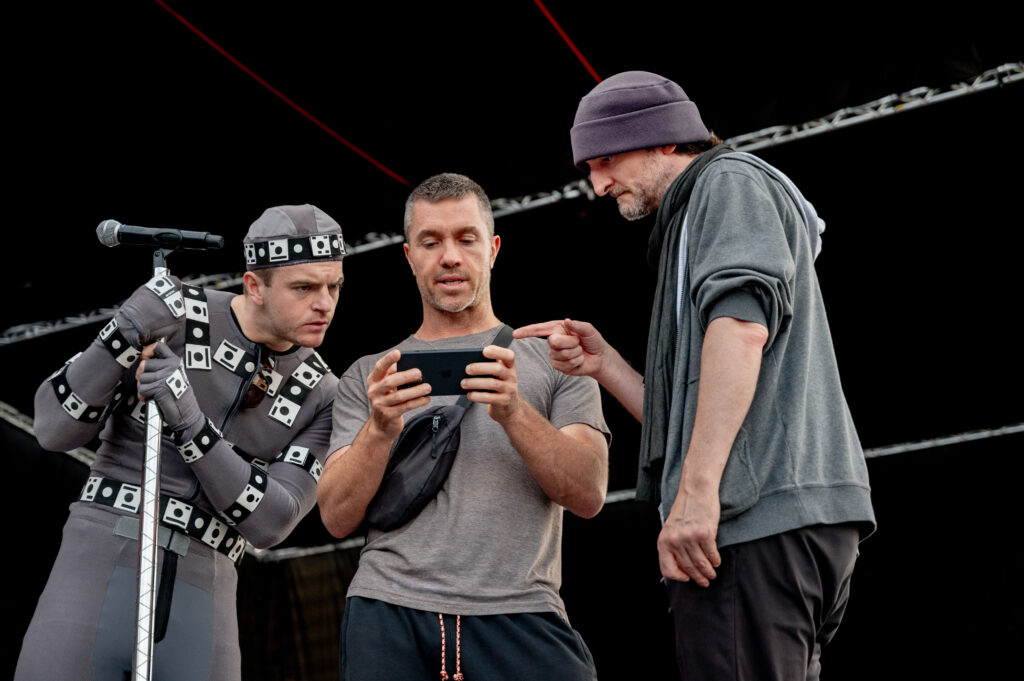
I’m interested about the collaboration with Wētā because this is such a unique approach to telling such a story like this. How did this particular collaboration work? Did you go in with, like, this is how we’re envisioning him, or was that sort of developing as you were filming how you wanted Robbie to look on screen?
MG: So Wētā was on board, you know, years before we started making the film. Andy Taylor, who’s the producer, and Luke Miller, who’s the visual tech supervisor, are a part of every step of this production. And Wētā themselves just really backed the project, you know, it was a real privilege to have a visual effects company at the top of their game, say, “We wanna be involved in telling this story.” And to the point where they set up a whole new studio in Melbourne, Australia to do it. It wasn’t a small commitment. They literally moved an office into Australia, and that office is going to stay there well past the film.
We did the previews with them when even before I had financing for the film, they would block out the musical numbers with me. All of the musical numbers, just in computer animation. I would then use those musical numbers and the previews to convince financiers that this was something that would work. So I would play “Feel,” and I would play “My Way,” and I would show the bookends of the film. For someone who comes from a background in animation and visual effects, I grew up looking at the work that Wētā did and was just in awe of it. So to then go and pitch this concept and have them back it in the way that they did, it’s the only reason the film exists. I owe a huge debt of gratitude to everyone at Wētā and the team of artists that ended up coming on. Because again, there’s amazing visual effects companies all around the world, but it just comes down to the individuals at that company.
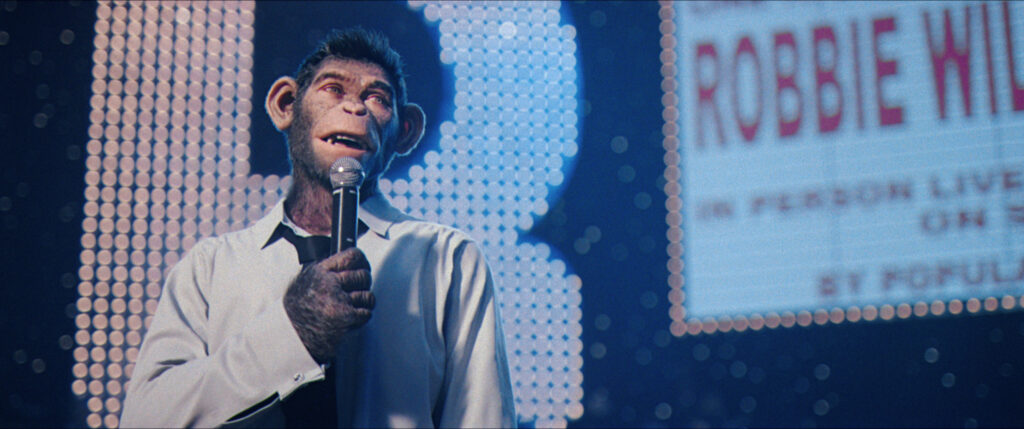
I was completely enamored with that “Rock DJ” sequence down Regent Street. As soon as it ended, I wanted to hit rewind and watch it again. What were you initially kind of envisioning as you plotted the sequence as well as set Take That’s rise to “Rock DJ”?
MG: The reason Take That’s rise is to “Rock DJ” is because it’s all in Rob’s head. Rob’s not the lead of Take That, but is in “Rock DJ.” It’s the one time that Rob never sees a version of himself during the musical numbers, you know? And so it’s sort of a pure expression of joy on Rob’s part, which at that moment of the film, you really want it, you know? And so there’s the coming up with that number, executing that number. It was years and years in the making. It was a lot of blocking it out with iPhones and Ashley Wallen, the choreographer, and Jenny Griffin, the assistant choreographer.
We would just grab a group of dancers and go down [to Regent Street] at like two and three in the morning and just dance down the street. It was an iterative creation with Ashley weighing in on it. Simon and Oliver, the writers, weighing in on it. And then, Wētā weighing in on it because we had to block the whole thing out in 3D and pre-vis it all to work out the sections by which we were gonna be able to break up the number. So it was such a group effort. All I can say is there’s no way you can come up with that in one moment. The musical numbers in this film are all very iterative. You sketch it, and you resketch it, and you resketch it, and you resketch it until the sketch resembles something that you go, “That’s what we want to do.”
For our filmmaking students at the Academy, what would you maybe advise for students who are maybe reserved or hesitant about taking or making a bold choice with their work, whether in school or afterward?
MG: You have to make the bold choice. And you have to accept that there will be times that you fail. And that’s okay. You are much better off failing by making bold choices than playing it safe and never failing. It doesn’t benefit you. You don’t evolve, you don’t learn. There are a lot of easy choices to make after doing a musical like “The Greatest Showman” and it being successful. And to be fair, at the time when I was making it, no one thought it was gonna work. You know? Everyone wanted to do a jukebox musical where you just use existing songs, a la “Moulin Rouge.” Fox had a lot of success with “Moulin Rouge,” and it was a period film, and they could wrap their heads around that. To be fair, when Baz was doing “Moulin Rouge,” no one had done a period film with contemporary songs and had success.
And so at the time when Baz was trying to do it, the studio, same studio, was dead against it. They did not want a period musical with contemporary songs. And he fought, and he fought, and he made an amazing film, which allowed Fox many years later to point to that film, which they didn’t want to be made, and say, “No, we don’t want you to make an original musical. We want you to go back and do what we had success with.” And as I pointed out to them, I said, “Yeah, but you didn’t believe in that back then.” Back then, the idea of doing a jukebox musical in a period film was absurd. kept getting told no one’s done an original musical for 23 years, and there’s a reason for that. And I was like, “There might be a reason for it, but I wanna do an original musical, and I want the music to be playing on the radio at the same time as the film’s out.”
And I literally got pulled aside and got told, stop saying that. You just sound naive. And I’m like, I’m not naive. That’s the ambition of this project. I know it’s a bold choice. It’s bold to say that you’re gonna create something that is gonna resonate with an audience in popular culture, that it’s gonna be playing in mainstream music. But that was the intention of “The Greatest Showman” from day one. And with this, again, the obvious choice would be just doing a normal musical biopic. And it would cost half the amount of money, and it would’ve been much easier to finance and much easier on every single front. But the bold choice is the more interesting one.
“Better Man” is now playing in theaters.
This interview has been edited for length and clarity.
